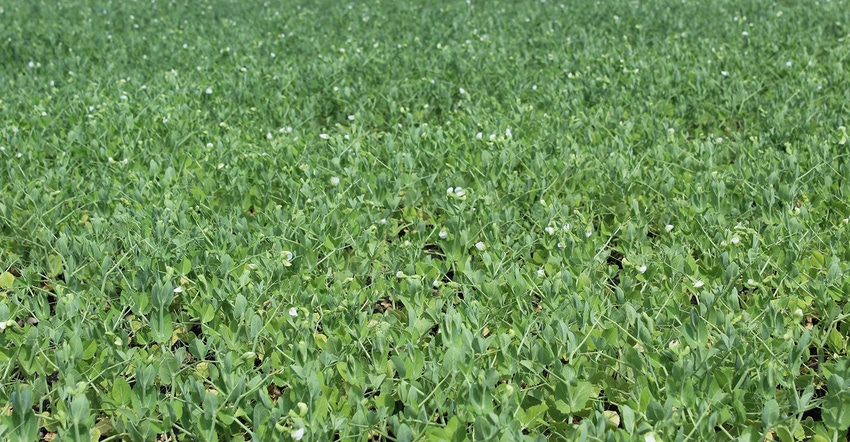
By Michael Hirtzer and Lydia Mulvany
There is, it would seem, nothing but bleak news in U.S. farm country. Soybean prices are down. Corn is also still way below its highs, as is wheat. Then there’s the trade war with China, which has cost farmers access to one of their biggest markets, and the non-stop spring rains, which inundated fields.
But there is one bright spot: the pea. Long an afterthought for most farmers -- largely just something planted to help with crop rotations -- the tiny legume has suddenly gotten pulled into the alt-protein craze fueled by the likes of Beyond Meat Inc. and the Impossible Burger.
Prices are moving higher, buoyed as well by rising demand from pet-food makers, and growers in the U.S. and Canada are now rushing to put more peas in the ground. Even those who are a bit put off by the whole vegetarian movement that’s driving the demand. Like Tony Fast. Beyond Meat’s goal of helping wean humans off meat consumption “does not interest me at all,” Fast says. “I am a traditional meat guy and pro-rancher.”
But with demand flat for the crops he’s been planting for years -- alfalfa for use in livestock feed and wheat -- Fast has turned to peas as a possible growth market. At his farm in northeastern Montana, the top U.S. pea growing state, he increased his plantings of the legume by about 20% to total 1,800 acres this season. Next year, he might sow 2,000 acres.
“At the beginning we didn’t see it as a money maker -- it just made the farm more sustainable,” Fast said by phone. But that’s changing now with his peas fetching close to $5 a bushel, up from about $2.80 a few years ago, which was roughly a break-even price. “I am excited for new markets for the peas.”
Alternative Crops
Part of the excitement comes after tariffs from India had clobbered the market. Prices for peas aren’t as transparent as say corn, where futures set a global benchmark, but many growers report they weren’t making much money from the legume. Still, the story the was the same for many staple crops, where excess supplies forced growers to look for alternatives.
So now whether they like the vegan burgers or not, North American farmers are boosting plantings. Growers in Canada and the U.S. are expected to seed about 20% more field peas this year, government data show. That’s happening even as U.S. farmers cut acres of principal crops including corn, soy and wheat by about 3%.
Plant-based companies have been around for decades, but products were aimed at vegans and vegetarians, a tiny market, according to Greg Wank, food and beverage lead at New York-based accounting and consulting firm Anchin, Block & Anchin LLP. Now that even meat-eating consumers are trying to get more of their protein from alternative sources, demand is taking off, underscoring the blistering debut of Beyond Meat. The shares are up about 500% since they started trading in May.
“It’s the right place and the right time,” Wank said.
To be sure, the market for pea crops is by no means as hot as the plant-protein stock. India’s tariffs have been in place for more than a year amid a global glut that’s kept a lid on prices. It’s also a tiny share of U.S. agriculture compared with mammoth crops like corn or soy. But the trade tensions have also forced the development of more processing capacity in North America.
In Saskatchewan, Oscar winner James Cameron announced an investment in Vanscoy-based pulse processing plant Verdient Foods, which U.S. ingredient maker Ingredion Inc. has also partnered with. In Manitoba, France-based nutrition company Roquette is building a pea protein plant that’s set to open next year. The company already operates a pea-protein plant in Vic-sur-Aisne, France, and has a supply agreement in place with Beyond Meat for this year.
Meanwhile, incessant rains in the U.S. meant not all farmers were able to get peas in the ground even if they wanted to.
Foiled Plantings
Jordan Carlson, 35, farms 3,500 acres with his dad near Gothenburg, Nebraska. He didn’t plant any peas for the first time in 10 years because of the deluge, and he’s predicting there could be some local shortages.
Even with India’s tariffs “the demand in food products is fairly high, and that’s keeping us from sinking on the price completely,” he said.
Some farmers are ready to welcome the changes that are ushering in that growth in demand. Even U.S. Agriculture Secretary Sonny Perdue, a self-declared meat eater, wasn’t immune to the lure of a vegan burger on a recent visit to the Impossible Foods Inc. headquarters, where he said the company’s signature offering tasted “very good.”
“I’m excited about things like Beyond Meat and Impossible Burger that are putting pea protein in their burgers. It’s awesome,” said Paul Kanning, who grows yellow edible field peas in Flaxville, Montana. Kanning didn’t increase his pea acreage this season, but if consumer interest is strong, he’ll consider it for next year.
“The demand is going to do nothing but increase, I believe, and you will see production increase in various areas of the U.S.,” he said.
--With assistance from Denitsa Tsekova and Ashley Robinson.
To contact the reporters on this story:
Michael Hirtzer in Chicago at [email protected];
Lydia Mulvany in Chicago at [email protected]
To contact the editors responsible for this story:
James Attwood at [email protected]
Millie Munshi, Joe Richter
© 2019 Bloomberg L.P.
About the Author(s)
You May Also Like




